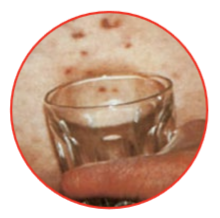

Tetanus, Diphtheria & Polio (Td/IPV) & Meningitis ACWY Immunisation Frequently Asked Questions
You need a total of five doses of tetanus, diphtheria and polio vaccines to build up and keep your immunity.
You should have had:
- the first three doses as a baby
- the fourth dose when you were between three and five years old, before you started school, and
- the fifth dose is due in year 9 (aged 13 to 14).
For protection against four groups (A, C, W and Y) of meningococcal infection, it is important to have one dose of MenACWY before you reach 19 years of age or if you are going to university for the first time.
You should have:
- The routine dose of MenACWY in year 9/10 (around 14 years)
There are very few teenagers who may not have the HPV, Td/IPV, and MenACWY vaccines. You should talk to your doctor or school nurse if you are 'immunosuppressed' because you are having treatment for a serious condition such as a transplant or cancer, or you have a condition that affects your immune system, such as severe primary immunodeficiency.
If you have a minor illness without a fever, such as a cold, you should still have the immunisations. If you are ill with a fever, put the immunisations off until you have recovered. This is to avoid the fever being associated with the vaccines and the vaccines increasing the fever you already have.
If you have:- had a bleeding disorder, or
- had convulsions (fits) not associated with fever speak to your doctor or nurse before having the immunisation.
It is common after injections to have pain, redness and swelling at the injection site. On very rare occasions side effects include fever, headache, dizziness, feeling sick, joint pains and swollen glands.
If you have any concerns don’t hesitate to contact your GP for advice.
If you feel unwell after the immunisation, take paracetamol or ibuprofen. Read the instructions on the bottle or packet carefully and take the correct dose for your age. If necessary, take a second dose four to six hours later. If your temperature is still high after the second dose, speak to your GP or call the free NHS helpline 111. It is not generally recommended that these medicines are given before or after vaccination in anticipation of a fever.
If you are aged under 16, you shouldn’t take aspirin or any medicine containing aspirin.
Early symptoms of meningitis and septicaemia are mild and similar to those you get with flu (such as feeling hot, being sick, and pain in the back or joints). However, for meningitis, the most important signs to look out for are:
- a stiff neck
- a very bad headache (this alone is not a reason to get medical help)
- lights hurting your eyes
- vomiting
- a fever
- drowsiness, being less responsive or confused and
- red or purple spots that don’t fade under pressure (do the glass test explained on the next page).
For septicaemia, the most important signs to look out for are:
- sleepiness, being less responsive or confused (a late sign in septicaemia)
- severe pains and aches in the arms, legs and joints
- very cold hands and feet
- shivering
- rapid breathing
- red or purple spots that don’t fade under pressure (do the glass test explained below)
- vomiting
- a fever, and
- diarrhoea and stomach cramps

Information
View our introduction to the Td/IPV & MenACWY vaccines,
how to contact us and what happens next
Useful Links
We have compiled a list of useful links
to find further information of the Td/IPV & MenACW vaccine
Consent Form
Go ahead and complete the form to give or deny consent for your child to be vaccinated at school
Complete Form